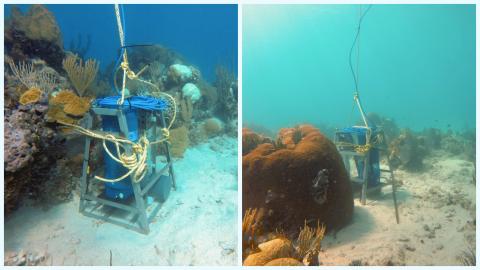
A team of NOC scientists and technicians were in Belize in October to deploy two NOC-developed sensors designed to monitor changes in ocean acidity across the barrier reef. This work will help inform evidence-based policy aimed at balancing the tensions between activities in the coastal zone and the conservation of vital ecosystems. The sensors use microfluidic lab-on-chip technology to measure pH, and are among the first of there kind to employ microfluidic techniques for autonomous oceanographic measurements.
After scouting for the best location for the sensors, the team carried out a test deployment of the two monitoring platforms to ensure they were properly calibrated and delivering consistent readings. The next step was to lower the platforms to their work sites on the reef (see the images below). The autonomous sensor platforms will now be left for 10 days to monitor the marine environment, after which one will be recovered and the other will be moved to its long-term site. The sensor will then collect data and transmit it back to shore in real time.
The NOC team has also been training colleagues in Belize to use and maintain the new equipment. This activity is helping Belize to achieve the United Nations Sustainable Development Goal 14.3 - to minimize and address the impacts of ocean acidification.
This fieldwork work has been funded by the Commonwealth Marine Economies (CME) Programme, in which NOC scientists are working in partnership with the Coastal Zone Management Authority and Institute (CZMAI) in Belize, the University of Belize, and the Centre for Environment, Fisheries and Aquaculture Science (Cefas) in the UK.